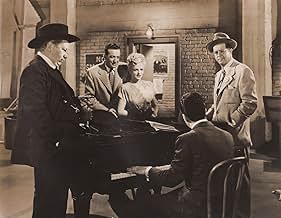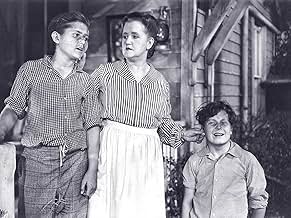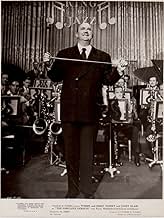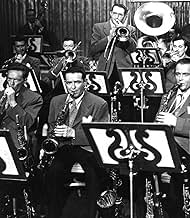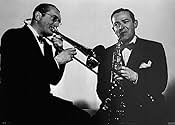VALUTAZIONE IMDb
5,6/10
686
LA TUA VALUTAZIONE
Aggiungi una trama nella tua linguaThe Dorsey Brothers bandleaders' lives traced from childhood music insisting father to fame rise eventual split furthering careers propelling with their music.The Dorsey Brothers bandleaders' lives traced from childhood music insisting father to fame rise eventual split furthering careers propelling with their music.The Dorsey Brothers bandleaders' lives traced from childhood music insisting father to fame rise eventual split furthering careers propelling with their music.
- Regia
- Sceneggiatura
- Star
Recensioni in evidenza
THE FABULOUS DORSEYS is not fabulous - a B feature with a C-minus script and D-plus dialogue - but the music at least is enjoyable, as I'd expect from a picture starring not one but two big bandleaders.
Laying aside the rickety wooden dialogue and nonexistent love duo, the story is compressed but basically true: poor Irish mining family produces two talented musicians who don't get along, but rise quickly through the band business, start their own outfit, then inevitably break up. As a band nut I'd have liked to see mention of some of the name orchestras of the 20s including the Dorseys - Jean Goldkette? Freddie Rich? - or of Joe Haymes, a forgotten talent who sold Tommy his first band. But that's just me.
Janet Blair (like the brothers a Pennsylvania girl, and one-time vocalist with Hal Kemp's band) just lights up the screen every time we see and hear her, leading us to wonder just what she sees in a stuffed-shouldered cluck like William Lundigan. Other vocal highlights come from ex-JD singers Bob Eberly and Helen O'Connell and TD's then current crooner, Stuart Foster. Instrumental stars Art Tatum, Ray Bauduc and Charlie Barnet add heart to a jam session sequence. Paul Whiteman, gruff, fast-talking and positive, obviously liked playing Paul Whiteman, liaison between fiction and musical reality.
TD and JD are actually OK on screen - they weren't actors but one should not expect them to be. The fault there is with the mawkishly written dialogue that flops out of everyone's mouths. Their real personalities are visible, though toned down: Tommy's natural side-of-the-mouth cockiness, Jimmy's salty dignity of the veteran trouper. (In reality Tommy was profane and given to physical violence; Jimmy was quiet, decent but more than a little bitter, and both had long love-hate relationships with John Barleycorn.)
The real-life Dorseys - their music, their problems, their era - still await a full-dress Hollywood treatment before their names totally fade from the culture. It's easy to imagine, say, Ben Affleck and Ed Burns in the roles of TD and JD, complete with booze, broads, cuss words, flying chairs, and original orchestrations.
(PS: Those commenting about how over-the-top Mom and Pop Dorsey's Irish brogues were should understand that the actors playing them actually were Irish.)
Laying aside the rickety wooden dialogue and nonexistent love duo, the story is compressed but basically true: poor Irish mining family produces two talented musicians who don't get along, but rise quickly through the band business, start their own outfit, then inevitably break up. As a band nut I'd have liked to see mention of some of the name orchestras of the 20s including the Dorseys - Jean Goldkette? Freddie Rich? - or of Joe Haymes, a forgotten talent who sold Tommy his first band. But that's just me.
Janet Blair (like the brothers a Pennsylvania girl, and one-time vocalist with Hal Kemp's band) just lights up the screen every time we see and hear her, leading us to wonder just what she sees in a stuffed-shouldered cluck like William Lundigan. Other vocal highlights come from ex-JD singers Bob Eberly and Helen O'Connell and TD's then current crooner, Stuart Foster. Instrumental stars Art Tatum, Ray Bauduc and Charlie Barnet add heart to a jam session sequence. Paul Whiteman, gruff, fast-talking and positive, obviously liked playing Paul Whiteman, liaison between fiction and musical reality.
TD and JD are actually OK on screen - they weren't actors but one should not expect them to be. The fault there is with the mawkishly written dialogue that flops out of everyone's mouths. Their real personalities are visible, though toned down: Tommy's natural side-of-the-mouth cockiness, Jimmy's salty dignity of the veteran trouper. (In reality Tommy was profane and given to physical violence; Jimmy was quiet, decent but more than a little bitter, and both had long love-hate relationships with John Barleycorn.)
The real-life Dorseys - their music, their problems, their era - still await a full-dress Hollywood treatment before their names totally fade from the culture. It's easy to imagine, say, Ben Affleck and Ed Burns in the roles of TD and JD, complete with booze, broads, cuss words, flying chairs, and original orchestrations.
(PS: Those commenting about how over-the-top Mom and Pop Dorsey's Irish brogues were should understand that the actors playing them actually were Irish.)
Engaging enough fictionalised musical biopic which sees the brothers (who play themselves) playing second fiddle to a lukewarm romance between William Lundigan and the rather lovely Janet Blair for much of the running time.
The movie tells the story of musician and bandleader brothers Tommy and Jimmy Dorsey (played by themselves), from their upbringing in Pennsylvania coal country to modest musical beginnings in small venues, to eventual radio success. Their fiery temperaments cause them to clash with each other often, eventually leading to a split and them each forming their own orchestras, after which they find even more success. Also starring Janet Blair as a childhood friend, singer, and peacemaker between the brothers, and William Lundigan as a composer and piano player for the band, as well as love interest for Blair.
Tommy the trombone player and Jimmy the saxophone player are excellent musicians but horrible actors. Thus the script focuses more often on the fictional characters played by Blair and Lundigan, neither of whom are much more compelling than the Dorseys. The viewer also begins to notice that not much of dramatic interest happens in the Dorseys lives other than them bickering like brothers do, so the only saving grace is the music, much of it performed by singers and musicians of the day playing themselves in cameos. I'm not familiar with many of them, but the music they perform is fine, and I'm sure will be appreciated by fans of the style.
Tommy the trombone player and Jimmy the saxophone player are excellent musicians but horrible actors. Thus the script focuses more often on the fictional characters played by Blair and Lundigan, neither of whom are much more compelling than the Dorseys. The viewer also begins to notice that not much of dramatic interest happens in the Dorseys lives other than them bickering like brothers do, so the only saving grace is the music, much of it performed by singers and musicians of the day playing themselves in cameos. I'm not familiar with many of them, but the music they perform is fine, and I'm sure will be appreciated by fans of the style.
The condition of the print that was transferred to DVD was just awful. This was no bootleg, either. It's the commercially available disc. That is a pity. Worse is the ham-handed acting and Irish accents think enough to cut with a dull knife. Even Barry Fitzgerald never laid it on that thick.
However... for me, it as all worth it to see Helen O'Connell sing "Green Eyes." Oh yes! So, I hold with many of the others' views: watch this for the music and skip the rest.
It would be a help if the print could be restored to a decent condition and a disc transfer made from that. However, the overall quality of the movie and, sadly, the lack of general interest in good music of the Swing Era, probably doesn't justify the expense.
However... for me, it as all worth it to see Helen O'Connell sing "Green Eyes." Oh yes! So, I hold with many of the others' views: watch this for the music and skip the rest.
It would be a help if the print could be restored to a decent condition and a disc transfer made from that. However, the overall quality of the movie and, sadly, the lack of general interest in good music of the Swing Era, probably doesn't justify the expense.
I watched this film this afternoon and I am amazed that Janet Blair didn't become one of the great sex symbols of the era. It was only for this beautiful, sexy woman that made me stay with it, (plus the fabulous music). The script was dreadful, the acting (apart from Ms Blair), was embarrasing and the storyline was desperately dull. So in summary if an actress can make me stick like glue to a bomb of a movie like that, she must be something special. Surely we can at least have a headshot!
Lo sapevi?
- QuizBob's concerto in the film is the "Dorsey Concerto", composed by Leo Shuken for the Dorsey brothers.
- BlooperAlthough much of the story takes place in the 1920's and 1930's, Jane's fashions, make-up and hair styles are straight out of the late 1940's when this picture was made.
- Citazioni
Mrs. Dorsey: There is only one thing worse than being Irish, and that's not being Irish.
- Curiosità sui creditiOpening credits appear in the turning pages of a book.
I più visti
Accedi per valutare e creare un elenco di titoli salvati per ottenere consigli personalizzati
Dettagli
- Tempo di esecuzione1 ora 28 minuti
- Colore
- Proporzioni
- 1.37 : 1
Contribuisci a questa pagina
Suggerisci una modifica o aggiungi i contenuti mancanti

Divario superiore
By what name was L'America dei Dorsey (1947) officially released in India in English?
Rispondi
